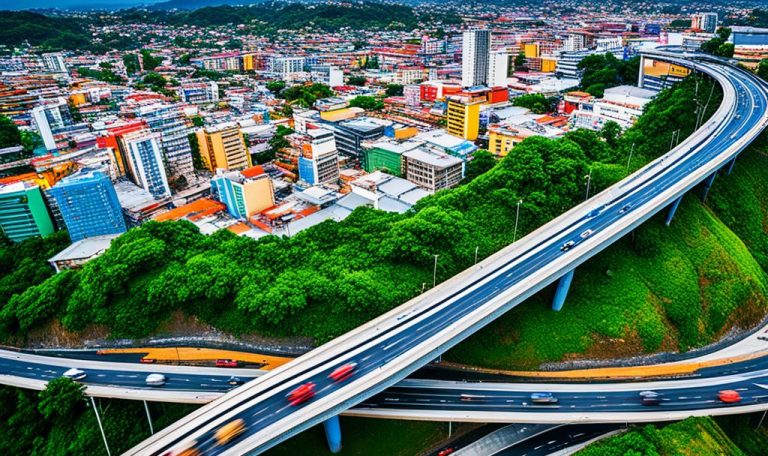The World Bank has recently approved a significant loan of $350 million for Costa Rica, marking a milestone in the country’s pursuit of economic growth and resilience. This loan is aimed at supporting Costa Rica’s strategy for mitigating and adapting to climate change while investing in resilient infrastructure and services to protect vulnerable areas.
The approved loan will enable Costa Rica to fund infrastructure projects that enhance climate and disaster resilience. This funding comes at a crucial time as Costa Rica has been facing the impacts of the climate crisis, with extreme weather events and natural hazards posing significant risks to the country’s economy and society.
Costa Rica’s finance minister emphasizes the importance of this loan as the country remains highly exposed to extreme weather events and natural hazards. By allocating funds to resilient infrastructure and services, Costa Rica aims to protect its citizens living in the most vulnerable areas.
Key Takeaways:
- The World Bank has approved a $350 million loan for Costa Rica to fund infrastructure and climate and disaster resilience projects.
- This loan will support Costa Rica’s strategy for mitigating and adapting to climate change.
- The funding will enable Costa Rica to invest in critical infrastructure projects that enhance climate and disaster resilience.
- By allocating funds to resilient infrastructure and services, Costa Rica aims to protect its citizens living in the most vulnerable areas.
- The loan will contribute to long-term economic growth and sustainable development in Costa Rica.
Funding Resilient Infrastructure
Costa Rica is facing the impacts of the climate crisis, with extreme weather events and natural hazards posing significant risks. In response to this challenge, the World Bank has approved a loan of $350 million to support Costa Rica in investing in critical infrastructure projects that enhance climate and disaster resilience.
This funding will play a vital role in addressing the effects of the climate crisis and building a more resilient economy and society in Costa Rica. By prioritizing the development of resilient infrastructure, Costa Rica aims to protect its citizens and mitigate the risks posed by future climate-related events.
The investment will focus on projects that improve flood control, slope stabilization, and the reconstruction of bridges and roads damaged by weather-related disasters. These initiatives will not only help mitigate the impact of climate change but also contribute to sustainable development and ensure the long-term well-being of the country.

Investment in resilient infrastructure is essential for Costa Rica’s future. It will enable the country to adapt to the challenges brought about by the climate crisis and ensure the well-being of its citizens. By strengthening infrastructure, Costa Rica can support economic growth and create a more sustainable and resilient future for all.
Strengthening Climate Change Mitigation and Adaptation Efforts
The World Bank’s financing will play a vital role in strengthening Costa Rica’s efforts to mitigate and adapt to the impacts of climate change. Recognizing the country’s high vulnerability to extreme weather events and natural hazards, the finance minister emphasizes the urgent need for action. By allocating funds to resilient infrastructure and services, Costa Rica aims to safeguard its most vulnerable communities from the devastating effects of climate-related risks.
Costa Rica’s commitment to climate change mitigation and adaptation aligns with its sustainable development goals and global efforts to combat the climate crisis. With international finance support from the World Bank, Costa Rica can implement strategic projects that enhance climate resilience, improve disaster preparedness, and protect vulnerable populations.
“Our collaboration with the World Bank enables us to address the immediate challenges posed by climate change and prioritize investments in resilient infrastructure. By securing international financing, we can accelerate our climate change agenda and ensure a sustainable and prosperous future for Costa Rica.”
The World Bank’s financial support empowers Costa Rica to build a more resilient economy while advancing its climate change agenda. This collaboration reinforces Costa Rica’s commitment to sustainable development and sets an example for other nations grappling with climate-related challenges.
Promoting Sustainable Development
By investing in resilient infrastructure and services, Costa Rica’s financing endeavors support its ambition to achieve sustainable development. The approved loan from the World Bank further strengthens Costa Rica’s economic growth and bolsters efforts to protect its most vulnerable populations.
The projects financed through the World Bank loan create opportunities for long-term economic growth and sustainable development in Costa Rica. These investments will drive innovation, create jobs, and foster a greener and more inclusive economy.
Costa Rica’s commitment to sustainable development, bolstered by international financial assistance, positions the country as a model for balancing economic growth with environmental preservation. By prioritizing resilient infrastructure and services, Costa Rica paves the way for a prosperous, sustainable, and resilient future.
Promoting Sustainable Development
The approved loan for Costa Rica aligns with the country’s strategy for promoting sustainable development. By investing in resilient infrastructure and services, the funding will support Costa Rica’s priority of building a resilient economy and protecting vulnerable populations. The projects financed by the World Bank loan will contribute to long-term economic growth and create opportunities for sustainable development in Costa Rica.
Enhancing Economic Growth
Costa Rica recognizes that sustainable development is key to achieving long-term economic growth. By investing in resilient infrastructure, the country can improve productivity, attract investment, and create job opportunities. The World Bank loan will enable Costa Rica to modernize its infrastructure, such as transportation networks, energy systems, and digital connectivity, which are vital for economic development. This investment will not only support current economic growth but also lay the foundation for future sustainable development.
Protecting the Environment
Costa Rica is known for its commitment to environmental conservation, and the approved loan will further support this endeavor. By investing in sustainable infrastructure and services, Costa Rica can minimize the adverse impacts of economic activities on the environment. For example, the country can develop renewable energy projects to reduce dependence on fossil fuels, implement waste management systems to reduce pollution, and protect biodiversity through sustainable land management practices. By prioritizing environmental protection, Costa Rica can ensure that economic growth is sustainable and in harmony with nature.
Building Resilience
The World Bank loan will also help Costa Rica strengthen its resilience to climate change and natural disasters. By investing in infrastructure that can withstand extreme weather events, such as floods or hurricanes, Costa Rica can reduce the vulnerability of its population and protect critical assets. Additionally, the loan will support initiatives to enhance disaster preparedness, early warning systems, and climate risk management. These measures will enable Costa Rica to recover more quickly from disasters, minimize economic losses, and ensure the well-being of its citizens.
Empowering Local Communities
The projects funded by the World Bank loan will not only promote economic growth but also empower local communities in Costa Rica. Through the development of infrastructure and provision of services, such as education and healthcare facilities, the loan will improve the quality of life for people living in rural and urban areas. This investment in human capital and social development will create opportunities for inclusive growth, reduce poverty, and enhance social cohesion.
Costa Rica’s Infrastructure Improvement Projects
| Project | Description | Expected Impact |
|---|---|---|
| Transportation Networks | Expansion and modernization of roads and highways | Improved connectivity and mobility, facilitating trade and economic growth |
| Renewable Energy | Development of solar, wind, and hydroelectric power projects | Reduced carbon footprint, increased energy independence, and lower energy costs |
| Climate Resilient Infrastructure | Construction of flood control systems and disaster-resistant buildings | Enhanced resilience to climate change and natural disasters, protection of lives and assets |
| Digital Connectivity | Expansion of broadband coverage and digital infrastructure | Improved access to technology, digital services, and opportunities for innovation |
| Social Infrastructure | Construction of schools, hospitals, and community centers | Enhanced access to education, healthcare, and social services for local communities |
Note: The table above outlines some of the key infrastructure improvement projects that will be funded by the World Bank loan. These projects represent Costa Rica’s commitment to sustainable development and will have a significant impact on the country’s economy and society.

Conclusion
The recent approval of a $350 million loan from the World Bank marks a significant milestone for Costa Rica in its pursuit of economic growth and sustainable development. This financial assistance will provide the necessary funds to invest in critical infrastructure and undertake climate and disaster resilience projects, enabling Costa Rica to tackle the challenges posed by the climate crisis and safeguard vulnerable communities.
With the support of the World Bank, Costa Rica aims to build a more resilient economy that can withstand the impacts of extreme weather events and natural hazards. By allocating funds to prioritize resilient infrastructure and services, the country aims to protect its citizens in the most vulnerable areas and mitigate the effects of the climate crisis.
By aligning the loan approval with its strategy for sustainable development, Costa Rica’s investments in resilient infrastructure will contribute to long-term economic growth. The World Bank’s financial assistance will play a vital role in advancing Costa Rica’s goals for sustainable development, fostering a more inclusive and prosperous economy for the future.



